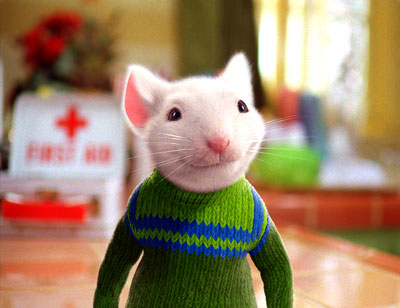 Humorist David Rakoff was at St. Mary’s College this past Friday as part of our Mark Twain series, and I found myself deeply impressed by what has been described as his melancholy wit. At one point the gay author of Don’t Get Too Comfortable and Half Empty talked about the importance of Stuart Little upon his life. I went on line and found the essay that he read to us.
Humorist David Rakoff was at St. Mary’s College this past Friday as part of our Mark Twain series, and I found myself deeply impressed by what has been described as his melancholy wit. At one point the gay author of Don’t Get Too Comfortable and Half Empty talked about the importance of Stuart Little upon his life. I went on line and found the essay that he read to us.
Marvelously entitled “The Love That Dare Not Squeak Its Name,” the Salon article (you can read it in its entirety here) confirms how vital a good story is in a child’s life. Rakoff, who as a small gay boy felt he didn’t belong anywhere, knew instantly that he had found a soul mate in E. B. White’s famous creation:
At age 7, having the book read to me in second grade by the sainted Mrs. Brailey, it was this initial confluence of traits — Stuart’s unquestioned membership in a family despite one glaring material difference from them and his tinyness only accentuating his courtly manners and dandy tendencies — that made me realize that I was somewhat like Stuart and that Stuart seemed, somewhat like myself, pretty gay.
This is not to say that Stuart Little necessarily sought the embraces of other boy mice. But had White, even in 1945, placed Stuart in his worsted blue suit with patch pockets anywhere near a schoolyard (there is an episode where he actually teaches school, but more on that later), Stuart would have learned conclusively from his human peers that he was, at the very least, a big fag, a sissy, a ‘mo and a poof.
Nor do I mean to claim the fine feeling and higher sentiment embodied by Stuart’s rarefaction as the exclusive province of the gays. Heaven knows that we inverts contain within our ranks many who have no manners to speak of, either shy or pleasant. And certainly a gray felt hat and cane are not necessarily gay props.
But props in and of themselves are an integral part of a gay childhood, with its vigilance against exposure, its years of passing. As a gay child, your life essentially consists of writing checks your ass can’t cover. The two remedies to this problem are either stepping back and remaining more an observer than a full-on, good faith participant, or going in for more performative behavior (during more judgmental times, we used to call this second option “living a lie”) until such time as one can move to New York.
After making a compelling case that Stuart is indeed gay and is never going to change, Rakoff talks further about the importance of getting this message at age 7:
Even White understands by [the end] that this is probably not a phase. Certain things might just not be in the tiny cards for some. And it was Stuart who taught me, in no small part, that this would be fine, too. Sitting on that classroom floor, legs crossed, I realized that I, like Stuart, might one day hope to walk down a big city street, a little mouse among many, “full of the joy of life and the fear of dogs.”
Don’t underestimate the power of the stories that you read to children. You are giving them life-saving resources. You may not always be able to predict which ones will take, however. So just read to them non-stop.



One Trackback
[…] comic essayist David Rakoff this past Thursday. David visited St. Mary’s in May and I posted here on his homage to E. B. White’s Stuart Little and what the dandified white mouse meant to a […]